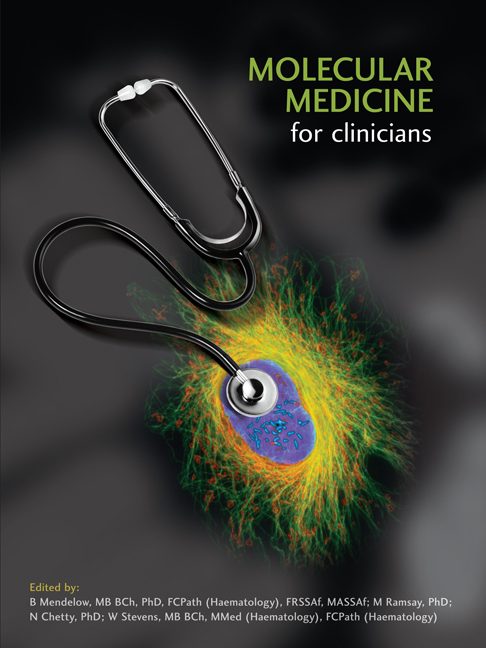Book contents
- Frontmatter
- Contents
- Foreword
- Acknowledgements
- Chapter 1 Introduction
- Keynote Essay 1: Defining Who We Are: DNA in Forensics, Genealogy and Human Origins
- Section 1 Principles Of Cellular And Molecular Biology
- SECTION 2 MOLECULAR PATHOLOGY
- SECTION 3 MOLECULAR THERAPEUTICS
- Chapter 32 Targets for Molecular Therapy: The Biology of Haemostasis
- Chapter 33 Cellular Targets of Antiplatelet Agents
- Chapter 34 Rational Drug Design
- Chapter 35 Chronic Myeloid Leukaemia
- Chapter 36 Gene Therapy
- Chapter 37 Diabetes Mellitus
- Chapter 38 Pharmacogenetics
- Chapter 39 Basic Molecular Biology of Blood Groups
- Keynote Essay 6: Molecular Research Case Study: Developing Novel RNA Interference-based Therapy
- SECTION 4 RESEARCH AND THE CONTINUING EVOLUTION OF MOLECULAR MEDICINE
- Glossary
- Contributors’ Biographies
- Source Material And Recommended Reading
- Permissions And Credits
- Index
Chapter 34 - Rational Drug Design
from SECTION 3 - MOLECULAR THERAPEUTICS
Published online by Cambridge University Press: 04 June 2019
- Frontmatter
- Contents
- Foreword
- Acknowledgements
- Chapter 1 Introduction
- Keynote Essay 1: Defining Who We Are: DNA in Forensics, Genealogy and Human Origins
- Section 1 Principles Of Cellular And Molecular Biology
- SECTION 2 MOLECULAR PATHOLOGY
- SECTION 3 MOLECULAR THERAPEUTICS
- Chapter 32 Targets for Molecular Therapy: The Biology of Haemostasis
- Chapter 33 Cellular Targets of Antiplatelet Agents
- Chapter 34 Rational Drug Design
- Chapter 35 Chronic Myeloid Leukaemia
- Chapter 36 Gene Therapy
- Chapter 37 Diabetes Mellitus
- Chapter 38 Pharmacogenetics
- Chapter 39 Basic Molecular Biology of Blood Groups
- Keynote Essay 6: Molecular Research Case Study: Developing Novel RNA Interference-based Therapy
- SECTION 4 RESEARCH AND THE CONTINUING EVOLUTION OF MOLECULAR MEDICINE
- Glossary
- Contributors’ Biographies
- Source Material And Recommended Reading
- Permissions And Credits
- Index
Summary
INTRODUCTION
The need for the development of new and improved drugs is clear given both the burden of disease in the world and the potential global market for drugs. Traditionally the discovery of drugs has been conducted using screening or serendipity-based approaches, where chemical compound libraries (either natural product or synthesised) are screened for specific biological activity. In contrast, drug design is a process that enables a drug com pound to be designed on the basis of the structural know - ledge of its biological target (which could be a receptor, enzyme, nucleic acid or other functional protein). A major benefit of the traditional screening techniques is that drugs can be discovered or selected without any knowledge of their critical molecular targets, whereas for rational drug design the identification and detailed, high-resolution molecular structural know ledge of the target molecule is required. Structure-assisted or structure-based drug design has been driven by advances in techniques such as protein X-ray crystallography, nuclear magnetic resonance (NMR) and computational biochemistry, which provide the tools and techniques for the ‘rational’ design of drugs. As background to this chapter, the section on protein structure in Chapter 3 should be revised.
There are also economic factors that are increasing the use of rational drug design processes in both academia and the pharmaceutical industry. Drug companies spend on average US$800 million to 1 billion in Research and Development to bring a new drug onto the market, and therefore finding drugs by chance or serendipity is no longer considered economical. The know ledge of the three-dimensional structures of protein targets that is emerging from structural proteomics and targeted structural bio logy programmes as well as computer-based modelling is expected to enable increasing numbers of drugs to be designed rationally. A word of caution, though – there is nothing irrational about the traditional drug screening methods of natural products or compound libraries, and screening and design often continue to be used together and complement each other in both the identification of new drug leads and optimisation of new drug candidates.
- Type
- Chapter
- Information
- Molecular Medicine for Clinicians , pp. 396 - 404Publisher: Wits University PressPrint publication year: 2008



